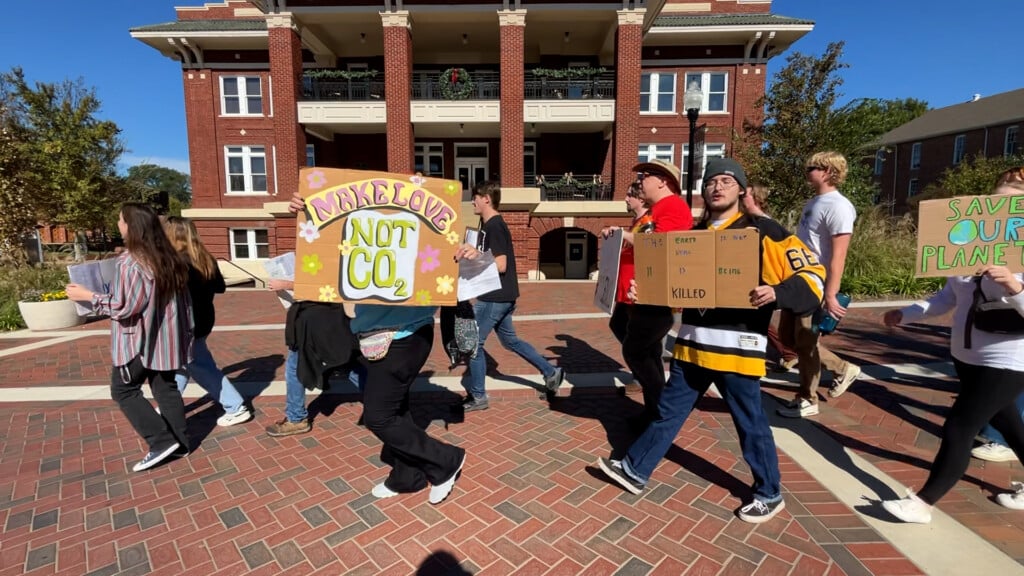Trump's meat mandate leaves worker safety unclear
President Donald Trump’s executive order stipulating the nation’s slaughter houses continue running as critical infrastructure leaves unclear how quickly his mandate will take hold at facilities already shut down due to deadly outbreaks of COVID-19 among workers.
Smithfield Foods is now considering next steps to reopen shuttered facilities, including its huge pork processing plant in Sioux Falls, South Dakota, where more than 200 workers were stricken. The company, a U.S. subsidiary of China’s WH Group, said it would “make announcements when it is ready to resume operations in each location.”
The White House order — when combined with guidance from government health, safety and labor agencies — “provides a much-needed framework that prioritizes employee health and well-being, while also stabilizing the country’s food supply and preventing the collapse of the agricultural economy,” Smithfield said in a Wednesday statement commending the action.
“Smithfield believes that the executive order will provide priority assistance in securing an ongoing supply of critical PPE, as well as aid the company in securing broader COVID-19 testing for its employees,” the company added.
The United Food and Commercial Workers, which represents 250,000 meatpacking and poultry plant employees, adopted a less trusting tone, calling on the president to enact “clear and enforceable safety standards” and access to federal stockpiles of personal protection equipment, or PPE, for workers.
“These workers are putting their lives on the line every day to keep our country fed during this deadly outbreak, and at least 20 meatpacking workers have tragically died from coronavirus while more than 5,000 workers have been hospitalized or are showing symptoms,” Marc Perrone, head of the UFCW, stated. “We must prioritize the safety and security of these workers.”
Mr. Trump told reporters that his Tuesday order would protect meatpacking companies from lawsuits by workers claiming they are not being protected from the coronavirus. That said, the order itself did not state anything specific about the issue nor address safety concerns of employees at the processing plants.
The bid to keep meat processing plants running drew predictable reactions along party lines.
The president displayed an understanding of the “critical importance of American agriculture,” stated Rep. K. Michael Conaway, a Texas Republican.
The White House is using the Defense Production Act in a way that could put workers at risk when it should be used to produce supplies to protect food workers, according to U.S. Senator Debbie Stabenow, a Democrat from Michigan. She joined the UFCW in calling on the Trump administration to implement a proactive plan to safeguard workers.
The president’s edict came as a slew of meatpacking plant closures chopped U.S. pork production by about a quarter and reducing beef output by about 10%, according to the UFCW.
“We estimate that roughly 20% to 25% of U.S. processing capacity has been suspended or still remains suspended, and another 30% to 35% of total industry processing capacity lies at risk” as workers at other pork processing plants have also tested positive, Ben Bienvenu, an analyst at Stephens Inc. wrote Tuesday in a note to investors.
Tyson Foods Chairman John Tyson warned in paid newspaper advertisements Sunday that the U.S. food supply chain “is breaking” and that millions of pounds of meat stand to “disappear” as processing plants close and farmers are forced to euthanize excess livestock they cannot sell.
Tyson shut down its pork processing plant in Waterloo, Iowa, after multiple employees tested positive for COVID-19. Elsewhere, JBS USA temporarily shut its meatpacking plant in Green Bay, Wisconsin, after health officials traced at least 189 coronavirus cases to the facility.
In the latest effort to motivate employees to show up, Tyson on Wednesday said it was doubling bonuses for 116,000 frontline workers and truckers, moving up an initial $500 payment to early May and promising a second $500 installment in July, with eligibility depending on attendance.
The company also said it was increasing short-term disability coverage to 90% of normal pay until June 30 for employees unable to work due to illness.





Leave a Reply